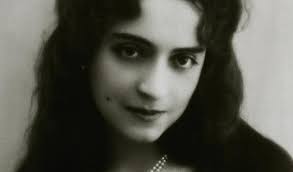From Sex Worker To Princess To Murderer

This is the tale of a multifaceted woman who lived a multitude of lives and adopted numerous aliases. From Marguerite Marie and Marguerite Laurent to Princess Fahmy and Maggie Meller, she embarked on a journey that took her from being a sex worker to becoming a companion to royalty, and ultimately a defendant in a trial that rocked society, charged with the murder of her husband.
Did she manipulate those around her to commit the crime, or was she a victim of circumstances? Did she genuinely fall in love with any of her partners? The answers to these questions, much like many other aspects of her extraordinary life, are complex and not easily defined.
Early Life in Paris
Marguerite Alibert was born on December 9, 1890, into a modest family in Paris. Her parents, Firmin Alibert and Marie Aurand, worked as a coachman and a housekeeper respectively, serving the wealthy and influential of the city. Despite their lowly status, Marguerite was captivated by the opulent world of the wealthy and dreamed of becoming a prominent figure in Parisian high society.
Although she was intelligent, elegant, and strikingly beautiful, her family's circumstances were about to take a drastic turn.
At the age of fifteen, tragedy struck Marguerite Alibert's family when her four-year-old brother was fatally struck by a truck. Her parents, holding her accountable for the accident, punished her severely by sending her to a Catholic boarding school run by the Sisters of Mary.
As a student, she was subjected to arduous domestic work and subjected to regular physical abuse by the nuns. Marguerite's independent spirit and natural talents spurred her to rebel against their oppressive treatment.
Despite the nuns' vigilance, Marguerite became pregnant during her first year at the boarding school, and the father's identity remains a mystery to this day. She gave birth to her daughter, Raymonde, and her life took a new turn.
Marguerite was eventually expelled from the boarding school due to her transgressions and was sent back home. Despite her efforts to leave the past behind, the traumatic experiences she endured during her time at the school left an indelible mark on her personality, shaping her in ways that would stay with her for life.
After being expelled from the boarding school, Marguerite Alibert struggled to find employment and support herself and her daughter, Raymonde. Her destitution was so severe that she was forced to send her child to live on a farm in the countryside.
Nevertheless, she remained resolute in her ambition to escape her impoverished life and mingle with the fashionable and affluent members of Parisian society.
In the early twentieth century, Paris was a captivating and luxurious city, and Marguerite recognized that prostitution offered a promising avenue for earning a good income. She began her career as a streetwalker, relying on her beautiful singing voice to draw clients at local bars and clubs, and always targeted the wealthiest patrons.
With her striking appearance and singular charm, Marguerite quickly became a favorite among her clients. It wasn't long before her talents caught the eye of Madame Denart, a prominent brothel owner who catered to wealthy clients.
Madame Denart saw that Alibert was smarter and prettier than most street prostitutes she came across, and took Alibert under her wing. Still at the tender age of sixteen years, Marguerite Alibert learned the tricks of her profession from an expert, and eventually grew into a high-class courtesan.
In 1907, Marguerite Alibert fell in love for the first time with Andre Meller, who was a wealthy wine merchant more than twice her age. However, there was a small problem: Andre Meller was already married.
Secured in an apartment bought by Meller, Marguerite took on his surname, becoming Marguerite Meller, perhaps in an attempt to give the relationship an air of legitimacy. Despite Alibert's insistence that they were married, this was not the case.
Their affair lasted until 1913 and during that time, Marguerite received a staggering two hundred thousand francs from Andre Meller, a sum that would be considered a fortune in modern times. It was clear that Marguerite had honed her skills in captivating and alluring wealthy men.

Rubbing Shoulders with Princes
It's natural to wonder whether Marguerite's feelings for Meller were genuine or if she was simply skilled in exploiting his wealth. Regardless, after the relationship with Meller ended, Marguerite wasted no time in seeking out another wealthy benefactor. Her talents soon caught the attention of the upper echelons of society.
During this time, the British royal family was on the hunt for an experienced courtesan to educate Prince Edward, the Prince of Wales and heir to the throne, about the ways of the world. In 1917, Edward was serving as a Grenadier Guards officer in World War I and was stationed in France.
Upon being introduced by his aristocratic friends, Edward was immediately taken by the beauty of Marguerite Alibert, and they began a royal affair.
During their affair, Edward and Alibert would meet in secret, and he even sent her around twenty love letters from his post on the Western Front. However, their intense relationship came to an end after about a year when Edward lost interest in Marguerite and started to pursue a married woman named Freda Ward instead.
After Edward's betrayal, Marguerite resorted to blackmailing the Prince with his love letters and extracted a hefty sum of money. Undeterred, she set her sights on Charles Laurent, a wealthy air force officer, and married him in 1919.
However, their marriage was short-lived, and they divorced just six months later. Marguerite once again received a large sum of money as a divorce settlement, which she added to her already considerable wealth. It's unclear whether her marriage to Charles was a genuine attempt at finding love or simply another money-making scheme.
Marguerite's fortune allowed her to establish herself as a financially independent woman. At only 30 years old, she owned a stable with 10 horses, two limousines, and an opulent residence on Avenue Henri-Martin in Paris. She brought her daughter back from the countryside and sent her to the best boarding school in the country.
However, Marguerite's luxurious lifestyle became too costly even for her wealth. In 1921, she set her sights on seducing a wealthy Egyptian businessman, Ali Kamel Fahmy Bey, to secure her financial stability.
After their introduction to Paris society in 1922, Marguerite Alibert converted to Islam to marry wealthy Egyptian businessman Ali Kamel Fahmy Bey. However, the marriage did not go as planned as her new husband had multiple wives and refused to grant Marguerite a divorce, trapping her in the marriage.
Trapped
Marguerite felt trapped and increasingly resentful of her treatment, with frequent and violent quarrels occurring between her and her husband. She even started making daily notes of things she did not like about him.
As an independent spirit, Marguerite could not bear this new life, and on the 9th of July 1923, things came to a head. During a particularly intense argument at the Savoy Hotel while on holiday in London, Marguerite shot her husband dead with a .32-caliber pistol.
Marguerite's trial for the murder of her husband began two months after the incident. With the suppression of her scandalous past, Marguerite played the victim of her husband's brutality and beastliness, presenting a compelling case for her acquittal. The jury was swayed by her defense, and she was acquitted of all charges.
After the trial, Marguerite withdrew from the public eye and lived the rest of her life in Paris. She died on January 2, 1971, at the age of 80. Despite the many scandals and controversies in her life, Marguerite Alibert managed to escape the consequences and live a long, eventful life.

 My First News Item
My First News Item My Nine News Item
My Nine News Item